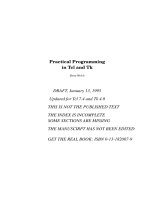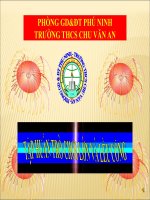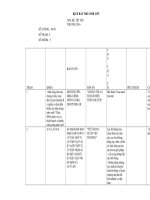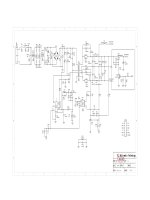1565924339 tcl 0648
Bạn đang xem bản rút gọn của tài liệu. Xem và tải ngay bản đầy đủ của tài liệu tại đây (324.6 KB, 7 trang )
TCL /TK
IN A NUTSHELL
A Desktop Quick Reference
TCL/TK
IN A NUTSHELL
A Desktop Quick Reference
Paul Raines & Jeff Tranter
Beijing • Cambridge • Farnham • Köln • Sebastopol • Taipei • Tokyo
About the Authors
Paul Raines is a physicist and scientific programmer at Stanford University’s Stanford Linear Accelerator Center. He is part of a large collaboration studying CP
violation (why charge times parity is not conserved in some particle decays, an
arcane research topic that bears on the more understandable question of why
there is an excess of matter over antimatter in the universe). He is a huge advocate of scripting languages and has been using Tcl on various projects since 1992.
He maintains a freely distributable quick-reference guide for Tcl/Tk, now
published as O’Reilly & Associates’ Tcl/Tk Pocket Reference. When he can get away
from the lab, Paul enjoys hiking, bridge, and soccer. He lives in San Mateo, California, with his wife Deborah and her horse and three cats.
Jeff Tranter works as a software designer for a Canadian telecommunications
company and has been using Tcl since 1992 on a number of programming projects
related to software tools and testing. He is an active user of Linux, a contributor to
the Linux Documentation Project, and author of the O’Reilly book Linux Multimedia Guide. His hobbies include ham radio, playing guitar, and mountain biking.
Colophon
The bird featured on the cover of Tck/Tk in a Nutshell is an ibis. There are over 30
species of these wading birds distributed throughout the world, primarily in the
warmer and tropical regions. All ibises have long, narrow, sharply turned-down
bills that they use to probe for insects, mollusks, and small crustaceans in mud or
dirt. They are strong fliers and swimmers, and most prefer living in the wetlands
near fresh or salt water, marshes, and swamps. They are very sociable and gregarious birds who nest in large colonies and travel in flocks. When flying, all
members of the flock alternate wing beats with gliding at approximately the same
rate.
Fossils indicate that ibises have existed for about 60 million years, and records of
human interaction with ibises dates back 5,000 years. In ancient Egypt, the ibis
was revered as the embodiment of Thoth, god of wisdom and scribe of the gods.
They are frequently depicted in Egyptian hieroglyphics, and cemeteries of mummified ibises have been discovered.
Today, the most widely distributed of all ibis species is the glossy ibis. The glossy
ibis is the last species of ibis known to exist in Europe and has spread to Africa,
parts of Asia, and the Americas. The most common species in the Americas is the
white ibis, which has gradually spread northward and is now found as far north as
Maine.
Edie Freedman designed the cover of this book using a 19th-century engraving
from the Dover Pictorial Archive. Kathleen Wilson produced the cover layout with
QuarkXPress 3.3 using the ITC Garamond font. Whenever possible, our books use
RepKover™, a durable and flexible lay-flat binding. If the page count exceeds
RepKover's limit, perfect binding is used.
Madeleine Newell was the production editor for this book, and Sheryl Avruch was
the production manager. Cindy Kogut of Editorial Ink did the copyedit. Nancy
Crumpton wrote the index, and Seth Maislin produced the final version of the
index. Nicole Arigo and Nancy Wolfe Kotary provided quality assurance, and
Sebastian Banker and Betty Hugh provided production assistance.
The inside layout was designed by Nancy Priest and implemented in gtroff by
Lenny Muellner. The text and heading fonts are ITC Garamond Light and Garamond Book. The screen shots that appear in the book were created in Adobe
Photoshop 4.0 by Robert Romano. This colophon was written by Clairemarie
Fisher O’Leary.








